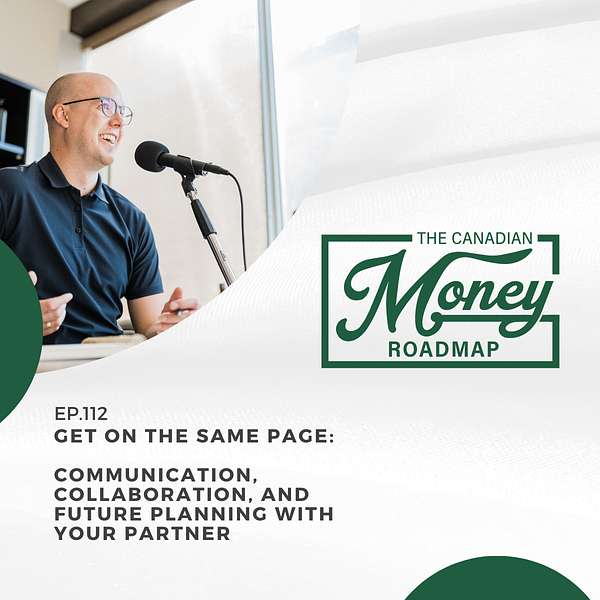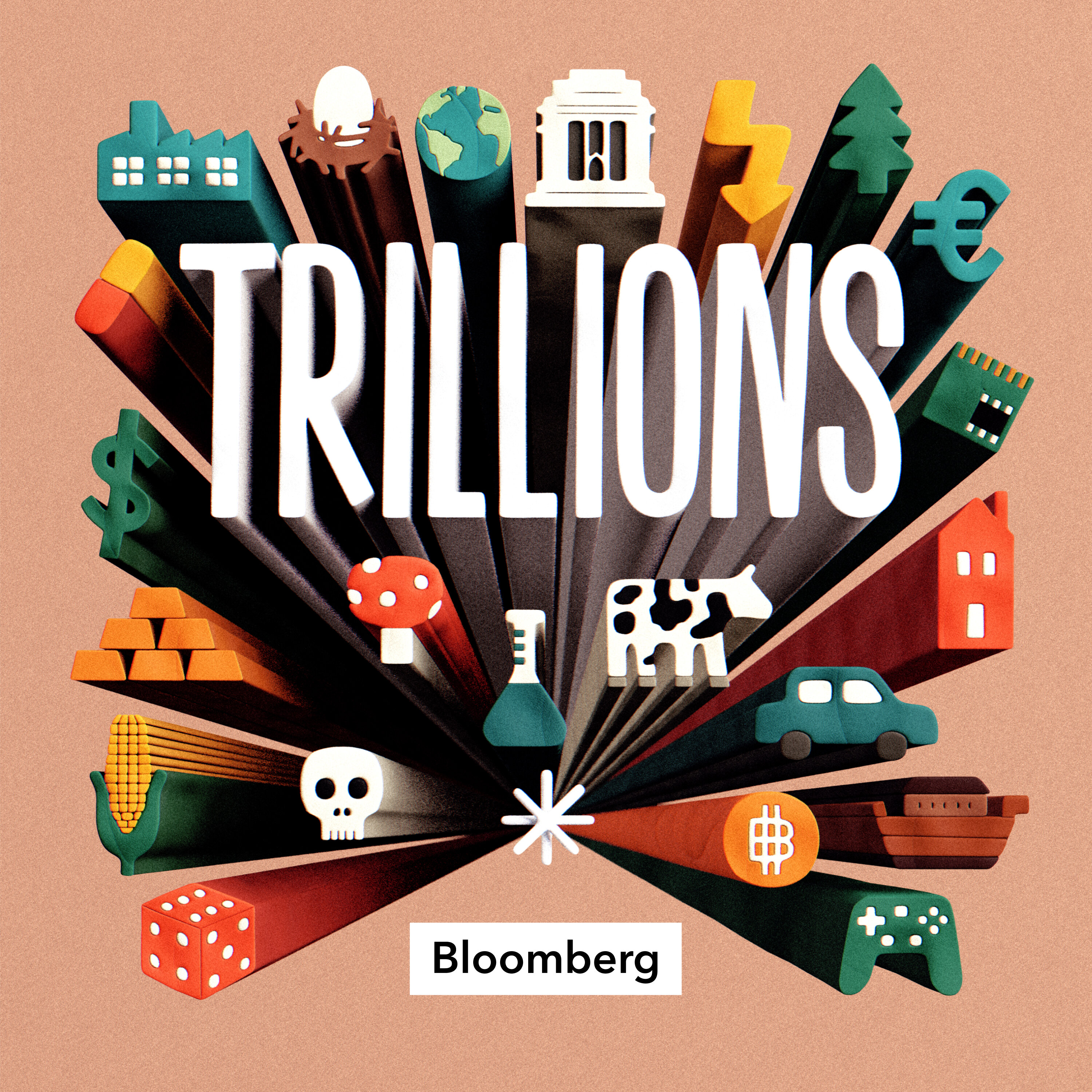
The Canadian Money Roadmap
Invest smarter, master your money, live & give more
The Canadian Money Roadmap
Get on the same page: Communication, Collaboration, and Future Planning with your partner
Dealing with money topics with a partner can be stressful and particularly stressful for the person who is not the "money person" in the relationship.
In this episode, I help outline a way that you can very simply explain your entire money life to your partner without getting into the weeds of technicalities.
The high level details of your financial life can fit on a single page under the following categories:
1. What do you have?
2. What do you owe?
3. Where are you going?
4. What if...?
Do more if you want! But start here to end the year on a note of transparency, clarity and openness.
🌳 Connect with Evan and Cedar Point Wealth | Services and Pricing
🗣️ I want to hear from you! Record your question here and you could be featured on an upcoming episode of the podcast
✨ Get your money organized - Your Full Financial Picture Spreadsheet
Okay now, when I say everything you have, I don't mean like literally everything, but just maybe some big things that are meaningful. That might not be obvious. So the value of the house, investment accounts, bank accounts, vehicles the big stuff, focus on the big stuff. Hello, and welcome back to the Canadian Money Roadmap Podcast. I'm your host, evan Newfield. Today's episode is the last new episode for 2023 and it's going to be particularly relevant for those of you that are married or in a money sharing relationship, and we're going to take a look at some ways that you can get on the same page with your money before the end of the year and going into the new year. Christmas time can get really expensive and sometimes emotions can run high when it comes to money and holidays and family and buying things and credit card bills and a lot of things that happen right now. In December and going into January, there can be a lot of stress around money. So I wanted to give you a little tip or a strategy of something that I've done with my wife, something that's been pretty effective, just for getting on the same page when it comes to money. So in many relationships, you might be able to relate to this, especially as someone that's listening to a money podcast. In many relationships there's often a money person I'll call them or say a non-money person. One partner may have more interest or skill or willingness or experience or whatever to manage the finances in the family or in the couple, and so it's pretty natural for that person to just take the lead on the vast majority of things, and that doesn't necessarily mean that they're the primary earner in the family, but they might be more familiar with even the terminology of things or how investments work or anything like that. So this is very, very common. So I wanted to put together some thoughts of how the money person in a couple can relate and empower the non-money person in the couple so that you can stay on the same page and hopefully minimize a few money spats or arguments, especially around Christmas time here, because the thing with the imbalance there it's a bit of a power dynamic. I know that maybe that's a little dramatic, but it kind of is. So the partner that's less involved in financial decisions might feel out of control or uninformed and unfortunately, as many of us know, money is a leading cause of stress in relationships and even divorces. I saw some statistics saying that there's about 68% of all divorces say that financial matters were the leading cause of their divorce. That's crazy, and so what can we do about things like this? Well, first of all, acknowledge who's who, and the relationship might be a good start. So if you're the one turning into financial podcasts or watching money management videos on YouTube or things like that, you might be the money person in your relationship, and with that role comes significant responsibility, and so your approach to finances can greatly impact your relationship, for better or for worse. But if you're not, the best tool that you have is free, and it is communication. So this isn't going to be a counseling podcast or anything like that. It's going to be super practical, but we're just going to talk about some ways that you can literally get on the same page with your money. Okay, let's get practical here. So now grab a piece of paper or open a Google doc or Word document or pages doc, whatever you're doing, maybe Apple notes if you're on the go, or whatever notes app you want to use on your phone, something like that, just anything. This isn't fancy. You don't need to build spreadsheets. There's no math, it's just a little bit of thinking. You might have to do a bit of research, but we're going to outline four key areas of your financial life. That will lead to, hopefully, a 30 to 60 minute conversation with your partner. You've got young kids, like we do. Put your kids down, have the conversation and kind of move on from there. This isn't going to be a big ordeal kind of thing, but in my experience it's been very, very helpful. So grab your paper and your document and let's get going. Number one of things that you're going to list you're going to write this down as a heading what do you have, right? The non-money person wants things to be simple and very, very clear. They don't want complicated, they don't want strategies or anything. We're going to make it simple here. Number one what do you have? So list all of your assets, in this case, and write it down house, car, tfsa, rsp, right, savings accounts. List your assets. We would put those into two categories. You don't have to lay this out, but just so you can see where my head is at. Anyways, you can list what we call liquid assets and liquid assets. I describe those as things that you own that you can spend. You can spend the savings account, you can spend the TFSA, you can spend your RSP. You have to pay tax, of course, but if it's totally possible cash in the bank, you can spend that. So those are liquid assets. Thick assets are the things that you own that you can't spend. So you can't spend the car, you can't spend the house, you can't spend the baseball card collection, whatever. Okay. So this is number one. Just list everything that you have, what it is and approximately what it's worth. Now, when I say list everything that you have, I just mean the big stuff. Don't worry about clothes or kids, toys, little things like that. Just focus on the big stuff, like your house, cars, investment accounts, bank accounts, those kind of things. If you're listing the house and you still have a mortgage, just list the amount that you think you would list it for if you were to put it up for sale today. Don't worry about the mortgage. We're getting there in number two, okay. So if you wanna get fancy while we're still in this first section here, what do you have? You could add it all up if you want to. You could break it down between liquid and fixed assets. That's totally fine. Or you could just talk about everything independently and just have it listed there, as long as the information is relatively clear and straightforward, that's a good start. Now, draw a line across your paper. Number two what do you owe? Okay, number one was what do you have Now? What do you owe, or what is your debt? You can call it whatever you want, this doesn't matter, but this is the other side of the equation here, right? So I want you to list all of your debts in total, so you could write house and then write your mortgage balance. Write car write your car balance. If you have a credit card outstanding debt, write credit card and how much you have left. If you wanna take it to the next level, add in your interest rate beside those numbers. If you don't know it, don't worry about it yet. Just listing everything, there is a good start. Then, if you wanna take things to another, next level again, you don't have to do this. I'd recommend it, though, but this is a next level thing. What is your plan for tackling each one of them? Well, mortgage we pay a mortgage every two weeks. Okay, that's the plan. Credit cards are you paying more than the minimum? Yes, your minimum's 50 bucks. We're doing 500. Great, that's your plan for tackling it. Your job is to just clearly explain that you have a debt, how much it is and what your plan is for getting rid of it. If you don't have one, that is a talking point that you could have with your partner, and I hope that that won't be an argument or anything like that, because this is coming from a place of transparency and clarity and trying to get on the same page. So if you need a plan for tackling it, this will bring that to light. So that's number two. Draw another line across your page. Okay, number three when are you going? So this is the section where you can just write your regular financial activities that are future-oriented. So buying groceries is not future-oriented. Buying diapers is not future-oriented. That's just making sure everything is sorted on a day-to-day basis. This is the where you're going in the future discussion Okay. So retirement savings how much are you doing there? You could say TFSA 500 bucks a month. Great, that's retirement savings. So for your partner that's the non-money person they will see okay, we are doing something intended for retirement in the future, got it? Whether that dollar amount is enough or the location is correct, honestly, for the purposes of this activity, it doesn't matter. You want to list what you're doing and maybe you could give an explanation to your partner about why you're doing it. But that's just. The main idea here is that you just want to be transparent about what you're doing to address that specific future goal An emergency fund. If you don't currently have a fully funded emergency fund and you want to, or need to and are planning on doing something with that, maybe you're setting aside a few hundred bucks, maybe 50 bucks, whatever, for an emergency fund on a regular basis. You could talk about debt repayment if you have significant debt challenges, that could be part of this one, but even things like short-term goals. It's like, well, mom and dad wanted to talk about going to Hawaii in a couple of years. What are we doing to address that now? Okay, you could use this section to discuss how you're going to plan for that future activity and what you're doing to address it New car, whatever, kids, education, all sorts of things like this. Don't get too crazy, don't overthink it. Just list the things that you're currently doing. Then maybe in your discussion, if you find some gaps of some future things that you're thinking of that you haven't put a plan together for, write them in there and work on that part together the last section that I want you to put on this single piece of paper. Now I hope you didn't go crazy and fill up your whole page with each one of these things. This thing should just fit on a piece of paper or a single word document. Here. The last section here are some what if scenarios Because, again, if you're the money person, you probably have a pretty good idea of what would happen if you were to pass away or if you were to lose your job. Those are kind of the big ones that I'm thinking of. But your spouse or partner, who is not the money person, might have no clue or they might have forgotten or whatever. So talk through those two big what if scenarios, write it down. Say this is what happens if I die. Boom, contact this person. Or life insurance has been purchased, the will is located here. You know all these different things that you could put in there. You can make that complicated, you can make that pretty simple. But if you have a plan of things that would kick in if you were to pass away, fill that in in the what if scenario. So your non money spouse has an idea that if you are gone, what are they going to do. Second one if you're the primary income earner, talk about what would happen if you were to lose your job or become disabled, using an emergency fund. Talk about disability insurance. Talk about a potential approach maybe for finding a different job. Depends on your stage of life and your career path and all sorts of things there, but a job loss can be pretty unnerving and obviously highly impactful for a family's finances. So just outlining a few of those critical what-if scenarios in my experience can really take a lot of the stress off of the non-money person who might not feel in the loop, but again, just talking about it is a great first step. So those are the four categories that I recommend anyways, for at least getting on the same page with something. This isn't going to solve all your money problems. If you're currently having disagreements with your spouse about many things. I don't pretend to know that I have everything about relationship counseling or your situation or anything like that, but if there is a situation where you have a money person and a non-money person, just start with these kind of things and I promise you that you will be better off as a result of this quick exercise and short conversation. Afterwards, again, the four categories are list what do you have, what do you owe, where are you going and what if? Fill them in as you see fit as appropriate for your situation. If you find yourself unsure about any of these topics, that is okay. Identifying these areas is your first step, and this could be then your area of focus for the upcoming year. Maybe that's paying off debt, building savings, buying insurance or just getting organized, that's okay. If the result of going through this activity says I have no clue about any of this stuff, perfect. At least you know that now, right, and now you need to get organized. So, speaking of getting organized, I have something that might help. This is a little bit more complicated than the exercise that I just outlined here. Maybe complicated is a bad word, but I would say more detailed or more comprehensive. I put together a spreadsheet. It's called my Full Financial Picture and you can find it in the link in the show notes below. I charge a few bucks for it If you'd like it. That just helps keep the lights on here at the Canadian Money Roadmap, but it's a comprehensive tool that just goes beyond the same page method that I talked about before, but it's perfect for storing critical information and keeping track of your financial life. So finishing things off here, remember, managing money is a couple. It's not just about the numbers. It's about building, maybe, a shared vision or understanding each other's goals, or navigating challenges together and making sure that you're on the same page More often than not will really really help when those challenges arrive or when some sort of financial adversity comes up. So take the time, have the conversations, start building that financial roadmap together, and you might be surprised at how empowering it could be for that person in your relationship who isn't maybe as interested in the financial side of things as you. So anyways, thanks for joining me on this podcast. Thank you for joining me here this year. This was a really cool year for me. I'm taking a little sidebar here. The podcast has grown immensely and I kind of hit a lot of my goals that I had for the podcast. Maybe you're not interested in this. That's why I kind of put this at the end here, but if you are interested, I wanted to hit 100 episodes. I did that. You're listening to episode 112 here. I think that was pretty cool. I wanted to move to a weekly format, which I was able to do for the vast majority of this year. It had a couple of weeks off and I was sick here and there, but more often than not I had a new episode of the podcast every week. I wanted to hit a quarter million downloads and, as I'm recording this right now, I've got 258,000, so that was pretty cool. I started this at home during COVID and I thought no one would ever listen to it. Here we are. This is pretty neat. I've got over 6,000 of you as followers. I know maybe that doesn't sound like much for the typical social media world, but from a podcast perspective, a number of listeners and whatnot that are on board here with the Canadian Money Roadmap. That puts me pretty close to the top 5% of all podcasts in the world, which is insane to think about. Anyways, thanks to you for listening and sharing. I get probably two or three emails every week from people that have recently found the podcast and then share it with their friends and family and coworkers and whatnot. That really means a lot to me, because this is a project that I started to just give back to people that I can't help on a one-on-one basis. I thought, well, if I could put just good financial information out into the world. I hope that more people would be able to benefit from it and, as a whole, canadians will have more high-quality resources at their disposal that are affordable and free in the case of this podcast and actually impactful in terms of making a difference in their financial life. I'll give you an example of some of the things that I hear from the podcast. This is pumping my own tires here a little bit, but, man, I don't need too many of these emails to make me feel good for the rest of the year and to keep going here. This is part of an email that I got from a listener this week. Uh-oh, jump to a middle section here. It says I stumbled on your podcast a year ago. We'll try to find some information about the best way to buy a used car in Canada. That was episode number two of my podcast, by the way, so that was deep in the vault, but anyways, he says, little did I know that a year later I'd find myself in the best financial position I've ever been in, both mentally and numbers-wise. I'm thriving and absolutely loving it. Long story short, your podcast played a massively pivotal role in that. So truly a massive thank you. I'm like my goodness, that's awesome. So knowing that there's people out there like this person who emailed me really makes me want to continue to produce the podcast and to do more if I can. So part of that is hopefully going to be adding some more video content on YouTube. Doing a podcast is one thing. Doing videos is another. It takes a lot more work and more equipment and more skills and things like that. So I'm kind of jumping into the deep end here. My first video is probably not going to be great, but I'm planning on just keep doing it, keep trying it and keep improving, because that's a different way that people can learn. It's a little bit different than listening to 20 minute podcasts about financial stuff. So, anyways, you can keep an eye out for that coming up in 2024. I'll stop rambling here, but that was a long-winded way of just saying thank you to all of you who've shared some kind words and shared the podcast with a friend. This community is growing far more than I ever thought would ever be possible, and so thank you. So I will sign off here for 2023 and I will see you with a new episode in 2024. Have a merry Christmas and happy holidays and we'll see you again in the new year. Thanks for listening to this episode of the Canadian Money Roadmap podcast. Any rates of return or investments discussed are historical or hypothetical and are intended to be used for educational purposes only. You should always consult with your financial, legal and tax advisors before making changes to your financial plan. Evan Neuveld is a certified financial planner and registered investment fund advisor. Funds and ETFs are provided by Sterling Mutuals Inc.
Podcasts we love
Check out these other fine podcasts recommended by us, not an algorithm.

The Rational Reminder Podcast
Benjamin Felix, Cameron Passmore, and Dan Bortolotti
Animal Spirits Podcast
The Compound
The Intelligence from The Economist
The Economist
The Compound and Friends
The Compound
Trillions
Bloomberg
The Journal.
The Wall Street Journal & Spotify Studios
Standard Deviations with Dr. Daniel Crosby
Dr. Daniel Crosby
